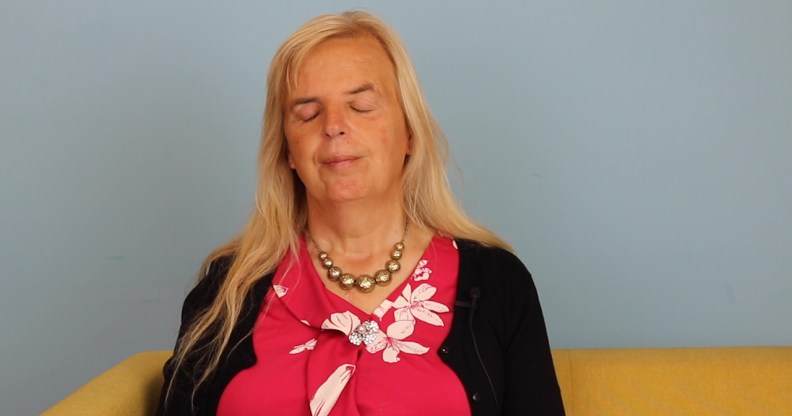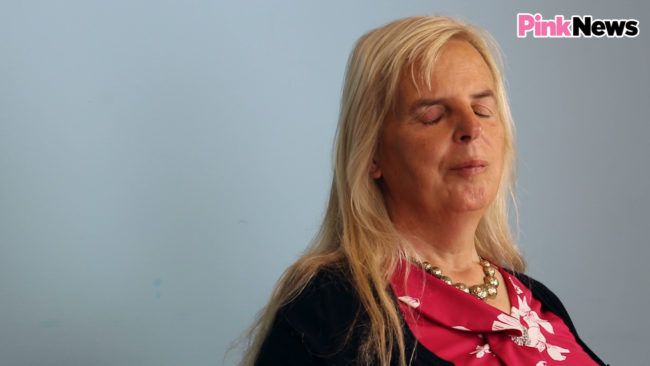How the internet helped me come out as a blind trans woman

Emily Brothers grew up without access to information about being trans (PinkNews)
As a blind teen in the seventies, Emily Brothers grew up without access to the internet or books about being a trans woman.
It was only when the internet boom came in the nineties that Emily—now a married, closeted parent in her thirties—was able to read about and connect with other trans women.
“As a blind person in the sixties and seventies we didn’t have access to wider information or technology and therefore I didn’t understand that I could be me,” she tells PinkNews.
“I just knew all about these taboos and it felt impossible to be the woman I felt.
“So I grew up trying to normalise and push away those feelings because I thought it was impossible, and that went on into adulthood.
“It was access to information that was a barrier.”
— Emily Brothers
“I married, had children, I had a lot to lose by shattering that world of values everyone around you was expecting.”
How the internet helped me come out
Now 54, Emily went to a school for blind and partially sighted students in Liverpool, which she found to be a “very isolated insular community.” She struggled without access to information about what it meant to be a trans woman.
“We didn’t have access to mainstream literature—magazines, newspapers, or other kinds of documents. What we had was a short number of braille texts which were very much about school learning,” she explains.

People see your disability before your gender, says blind, trans woman Emily Brothers (PinkNews)
“So it was only read in the nineties, well into my thirties, that having access to the internet and a whole wealth of information that I was able to understand better that there were routes to transitioning.
“I then was able to go to a support group in quite a bit of secrecy and talked to other people who had gone through the same things and that was invaluable.
“It took my a while to then seek medical support, come out to my family, and then come out to the wider world having transitioned.
“But it was access to information that was a barrier. I didn’t have an environment which was open and I couldn’t access a whole range of information.”
What it is like being a blind trans woman?
Besides challenges around transitioning, Emily said disabled people are too often viewed as “sexless.” It’s usually easier to date another disabled person because “the power dynamics can be different.”
“If you don’t fit the standard look of being attractive then you can be dismissed,” she tells PinkNews.
“People will see your disability first, rather than your gender.”
— Emily Brothers
“People often do not see disabled people in any kind of sexual or attractive way or as a potential romantic partner. To think we might be gay is also a step too far for some people.
“When I was going through my transition, a psychiatrist told me that as a disabled person transitioning, people will see your disability first rather than your gender and that will bring me an advantage.
“In a kind of bizarre way, it can be an advantage because people see the disability and they don’t think beyond that because there’s quite a lot of information there for them to process, without thinking that I may have gone through a transition or may be gay.”
“I want to be safe when I go to a female public toilet, just as much as anyone else.”
— Emily Brothers
When starting to transition as a trans woman, being blind brought some unique challenges and she need support from the trans community and allies.
“I couldn’t look in a mirror and decide whether I looked appropriate, whether I would pass or not, whether I should do something different,” she said.
“It was difficult applying makeup because I would turn orange and not know it—all kinds of practical issues.
“So I needed to take advice from other people and I had to adjust. Fortunately it worked out for me but it can be different for other people.”
Trans women are not a threat
Following the Gender Recognition Act reform consultation, there has been a “backlash against trans rights” driven by fear, Emily believes.
“Fear is often the thing that holds us back from coming out but it’s also fear that drives those seeking to undermine rights. It’s fear of the unknown and also a lack of understanding of the evidence,” she explained.
“Trans women using female toilets does not pose a risk, there is no evidence for it. It’s scaremongering and we need to challenge it.
“Because women with a trans experience are perhaps vulnerable we can be an easy target.
“We just need to be kinder and gentler to each other.”
— Emily Brothers
“There’s no way that I or other women with a similar experience want to jeopardise the rights and protections of other woman—far from it. I want to be safe when I go to a female public toilet, just as much as anyone else.
“I know from my campaigning for disabled toilets, businesses complained that making reasonable adjustments for disabled people would put them out of business and that it’d be an economic disaster.
“Did it happen? No, of course not, 20 years later businesses are continuing to provide reasonable adjustments and are often proud to explain what they’re doing for disabled people.
“Sure there is still a long way to go, there’s a lot of bad practice, but things have changed for the better for disabled people and better for businesses because they are more inclusive.
‘We just need to be kinder and gentler to each other, rather than dividing us.”

